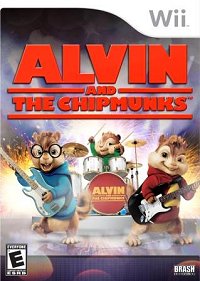 |
|
New England Gamer
|
January 2012
Licensed to Fail
The licensed game.
The words alone are often enough to earn a shudder from a devoted gamer.
Licensed games, or for the uninitiated, games based on an existing property (often
a popular movie, cartoon, etc) in general, are awful. There are varying reasons for
this. Some of it can simply be blamed on the content they're based on. Walking
into a game based on Alvin and the Chipmunks for instance, one might be forgiven
for expecting a certain level of terrible.
That said, there are plenty of licensed titles based on properties that should lend
themselves excellently to video games. Just look at the superhero flicks that have
dominated theaters the past few years: Iron Man, Thor, Captain America, hell
we'll even throw Green Lantern in there. Any one of these could have made
excellent games, but by and large, their video game adaptations ranged from
mediocre to awful. It's such a common occurrence that it's become something of
an unwritten rule: unless it's a Batman game made by Rocksteady, based on a
Spider-Man film, or made by Capcom in the late-80s/early-90s, license games
suck.

It's not hard to understand why. Licensed games generally aren't made with
quality in mind. Whereas the biggest games in the industry tend to be multi-year
efforts with multi-million dollar budgets and teams of developers numbering in the
hundreds, licensed games are often hastily thrown together to match up with the
release of a new movie in the hope that uninformed consumers will buy them on
name recognition alone.
And yet this is a strategy that works. Many licensed games, regardless of quality,
sell fairly well. You can blame it on the children. Trust me, I know from experience.
Granted, I wasn't quite a child in the year 2000. In the least, at thirteen, I had some
knowledge about games at the time and knew what to avoid. But I was also a nerd,
and sometimes the desire to play as something I loved from a favorite show
overrode all the lessons learned from years already spent gaming.
In the year 2000, Gundam Wing premiered on Cartoon Network and I fell
absolutely in love with it. The show, a Japanese cartoon about wars fought with
giant humanoid robots, became a huge part of my life, and even today it still holds
onto a piece of my affection. Back at the dawn of the millennium though, I was a
man obsessed. The show became a part of my daily ritual. I couldn't miss an
episode and actually got into one of the few verbal arguments of my pubescent
years over the show.

One day my brother dared to change the channel.
"What do you think you're doing?" I asked angrily.
"Dude, you seen this one already." He replied.
"But this is the unedited version!" I shot back. I still can't fathom why he won that
argument.
Then, one day on a visit to EB Games, I saw it. It was the Holy Grail. The next
dose to get me to the next phase of my addiction. On the shelf was a Gundam
game. Mobile Suit Gundam: Journey to Jaburo, to be exact. It didn't matter that it
wasn't Gundam Wing (I won't begin to explain the intricacies of the Gundam
franchise). It didn't even matter that was sitting in the middle of a venerable thrall
of better games. It was a Gundam game and I had to have it.
I took it home and for one night I knew gaming nirvana. I played it from dusk until
dawn. My mother woke up to find me still laying on the floor, eyes rimmed with
red and the controller in my hand. "You got up early." She said, assuming the best.
I didn't correct her. I don't even recall if I gave any response. My eyes, my mind,
my very soul was too fixated on the experience before me.
Of course, it was actually pretty bad.
I would eventually go on to sell my copy of Journey to Jaburo. Recently though,
while browsing at a local used game store I found a copy, and feeling nostalgic
bought it. The controls were clunky, even for that time period. Unbelievably, that
experience that consumed me for an entire night now took a mere two hours to
clear the entire game. As the credits rolled on this game that had once been a
favorite, I couldn't help but wonder how I had been so blind to all of the game's
poorer qualities.

The short answer is, because I was a fan. It was never really the game that I loved.
What I loved was the opportunity to experience a franchise that I adored in a new,
interactive way. I was no longer a spectator watching something cool take place. I
was the hero. When you look at it in those terms it's not hard to understand why a
child might look at a licensed game and see not a rushed cash-in, but rather the
greatest thing ever. The game doesn't need to be good. The mere chance to
participate can be enough.
This isn't to say that I can agree with lousy licensed games. Honestly, I can't think
of many shames greater than a development team being forced to take a great
intellectual property, fertile with opportunity, and run it into the ground. However,
I can understand the appeal of them and even today I have to admit that Journey to
Jaburo, flaws not withstanding, is fun for me. Playing through it again, even with a
more mature critical eye, there was a part of me still squealing inwardly as I took
control of my giant robot and relived the fantasies of my past.
Continued Below Advertisement
Read more by Stewart Shearer